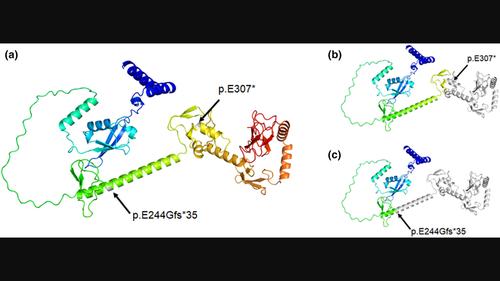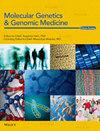A case of polyglucosan body myopathy caused by an RBCK1 gene variant and literature review
IF 1.5
4区 医学
Q4 GENETICS & HEREDITY
引用次数: 0
Abstract
ObjectiveTo analyze the clinical and genetic characteristics of a patient with Polyglucosan body myopathy 1 (PGBM1) caused by a novel compound heterozygous variant in the

一例由 RBCK1 基因变异引起的多葡聚糖体肌病及文献综述
方法 收集患者的临床资料,利用新一代测序技术测定患者的外显子组序列,并通过 Sanger 测序验证疑似致病位点。G>T;p.(Glu307*)和 c.723_730dup;p.(Glu244fs)变异,构成复合杂合变异。根据美国医学遗传学和基因组学学会(ACMG)的指南,这两个变异被评为致病性变异,但没有可比病例。结论该患者两次被诊断为心功能不全,忽视了肌无力的通常表现,导致误诊。后来,通过全外显子组测序发现了 RBCK1 基因的新型变异,并在确诊后给予了对症治疗。会议强调了全外显子组测序技术在疾病诊断和遗传咨询中的重要性。
本文章由计算机程序翻译,如有差异,请以英文原文为准。
求助全文
约1分钟内获得全文
求助全文
来源期刊

Molecular Genetics & Genomic Medicine
Biochemistry, Genetics and Molecular Biology-Genetics
CiteScore
4.20
自引率
0.00%
发文量
241
审稿时长
14 weeks
期刊介绍:
Molecular Genetics & Genomic Medicine is a peer-reviewed journal for rapid dissemination of quality research related to the dynamically developing areas of human, molecular and medical genetics. The journal publishes original research articles covering findings in phenotypic, molecular, biological, and genomic aspects of genomic variation, inherited disorders and birth defects. The broad publishing spectrum of Molecular Genetics & Genomic Medicine includes rare and common disorders from diagnosis to treatment. Examples of appropriate articles include reports of novel disease genes, functional studies of genetic variants, in-depth genotype-phenotype studies, genomic analysis of inherited disorders, molecular diagnostic methods, medical bioinformatics, ethical, legal, and social implications (ELSI), and approaches to clinical diagnosis. Molecular Genetics & Genomic Medicine provides a scientific home for next generation sequencing studies of rare and common disorders, which will make research in this fascinating area easily and rapidly accessible to the scientific community. This will serve as the basis for translating next generation sequencing studies into individualized diagnostics and therapeutics, for day-to-day medical care.
Molecular Genetics & Genomic Medicine publishes original research articles, reviews, and research methods papers, along with invited editorials and commentaries. Original research papers must report well-conducted research with conclusions supported by the data presented.
 求助内容:
求助内容: 应助结果提醒方式:
应助结果提醒方式:


